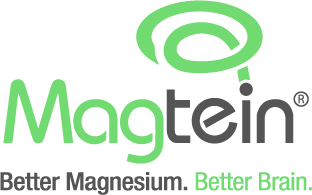How Much Magtein® Should I Take?
https://magtein.com/wp-content/uploads/2025/10/Screenshot-2025-10-24-at-6.33.34-PM.png 772 514 Riley Forbes Riley Forbes https://secure.gravatar.com/avatar/3f6c9bbe830133d8a02b6d78dd24a6cf57f35765554b3106fa7c0bce0d8772aa?s=96&d=mm&r=gUnderstanding Magnesium L-Threonate Dosage
One of the most common questions people ask about Magtein (magnesium L-threonate) is how much to take. The answer isn’t always simple. Because magnesium L-threonate is a specialized compound, the amount of elemental magnesium it provides differs from the total compound weight listed on supplement labels.
Understanding this difference helps you compare magnesium supplements accurately. It also ensures that your intake aligns with what has been studied in clinical research.*

Elemental Magnesium vs. Total Compound: Why the Numbers Look Different
Each form of magnesium contains a different percentage of elemental magnesium – the pure magnesium your body can use. Magnesium oxide, citrate, glycinate, and L-threonate all vary in how much magnesium they deliver.
For Magtein, each gram of magnesium L-threonate provides roughly 7-8% elemental magnesium. That means a 2-gram dose delivers about 144 mg of elemental magnesium.
This can be confusing because supplement labels often list the total compound weight – for example, “2,000 mg of magnesium L-threonate.” However, that number doesn’t represent the actual amount of magnesium.The advantage of magnesium L-threonate lies not only in its magnesium content but also in its ability to cross the blood-brain barrier. This allows it to support brain magnesium levels more effectively than many other forms.*
Magtein Dosage in Clinical Research
Human studies have explored how different daily doses of Magtein affect brain function, mood, and sleep quality. Across multiple trials – including those published in Neuropharmacology (Slutsky et al., 2010), Journal of Alzheimer’s Disease (Liu et al., 2016), and Sleep Medicine X (Hausenblas et al., 2024) – participants typically took between 1.5 and 2 grams per day of magnesium L-threonate.
Here’s what these studies found:
- 1.5 grams per day (approximately 108 mg elemental magnesium) supported cognitive function and mood balance in adults weighing 50-70 kg (110-155 lbs).
- 2 grams per day (approximately 144 mg elemental magnesium) supported sleep quality, focus, and resilience in adults weighing 70-90 kg (155-200 lbs).
- The compound was well-tolerated across studies, with mild gastrointestinal effects being rare and transient.
These results suggest that body weight may play a role in ideal dosing, though more research is needed to confirm this relationship.*
When to Take Magtein
Timing can affect how well your body absorbs magnesium. Most research protocols divided the total daily dose into two or three servings – for example, one dose in the morning and one in the evening.
Taking Magtein with or after a meal can support steady absorption. Many people also find that an evening dose aligns with magnesium’s natural role in helping the body relax before rest.*
More importantly, consistency matters. Regular use appears to support gradual increases in brain magnesium over time, as shown in clinical research.*

How Magtein Differs from Other Magnesium Forms
Many magnesium supplements are formulated to support muscle relaxation, digestion, or general magnesium replenishment. Magtein is different. It was developed to elevate magnesium levels in the brain – an area that most magnesium forms struggle to reach.
This difference comes from its unique structure. Magtein combines magnesium with L-threonic acid, a metabolite of vitamin C that improves solubility and cellular transport. In published studies, this structure increased brain magnesium concentrations, which may support mental clarity, focus, and restorative sleep.*
Safety and Considerations
Magtein is considered safe for adults when used at the studied doses of 1.5-2 grams per day. Individuals with kidney disease or those taking medications that affect magnesium levels should consult a healthcare provider before use.
Because magnesium can have a gentle laxative effect in higher doses, starting at the lower end of the clinical range and gradually adjusting may help your body adapt comfortably.*
Remember, supplements should always complement – rather than replace – a balanced diet and healthy lifestyle. Adequate hydration, a magnesium-rich diet (including leafy greens, nuts, and legumes), and consistent sleep routines all work together to support overall wellness.*

Key Takeaway: Science-Backed Dosing for Brain and Sleep Support
Magtein stands apart from other magnesium forms by combining advanced bioavailability with strong scientific support. Research suggests that 1.5-2 grams daily, taken in divided doses, can be an effective range for most adults. This dosage supports focus, relaxation, and restorative sleep as part of a healthy routine.*
References
- Slutsky I, Abumaria N, Wu LJ, et al. Enhancement of learning and memory by elevating brain magnesium. Neuron. 2010;65(2):165–177.
- Liu G, Weinger JG, Lu ZL, et al. Chronic oral administration of magnesium-L-threonate improves learning and memory and upregulates synaptic plasticity-related proteins in aged rats. J Alzheimers Dis. 2016;49(4):953–966.
- Hausenblas HA, Lynch T, Hooper S, et al. Magnesium-L-threonate improves sleep quality and daytime functioning in adults with self-reported sleep problems: A randomized controlled trial. Sleep Med X. 2024;8:100121.
- National Institutes of Health (NIH). Magnesium – Fact Sheet for Health Professionals. https://ods.od.nih.gov/factsheets/Magnesium-HealthProfessional/
- WebMD. Magnesium: Uses, Side Effects, Interactions, Dosage, and Warning. https://www.webmd.com/vitamins/ai/ingredientmono-998/magnesium/
These statements have not been evaluated by the Food and Drug Administration. This product is not intended to diagnose, treat, cure, or prevent any disease.





























